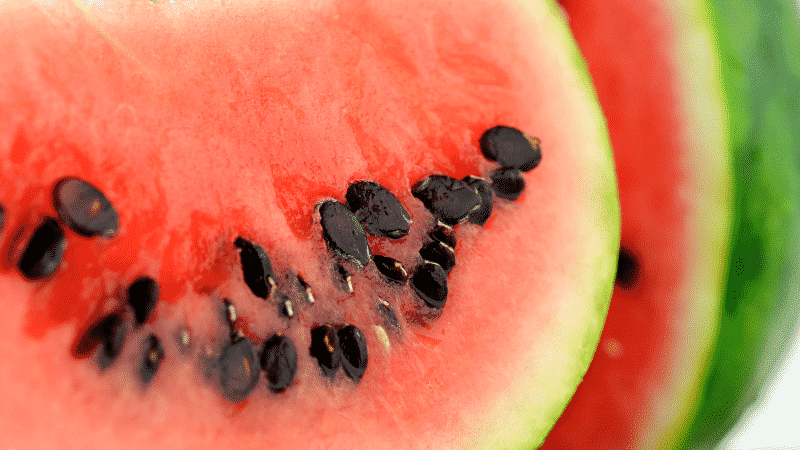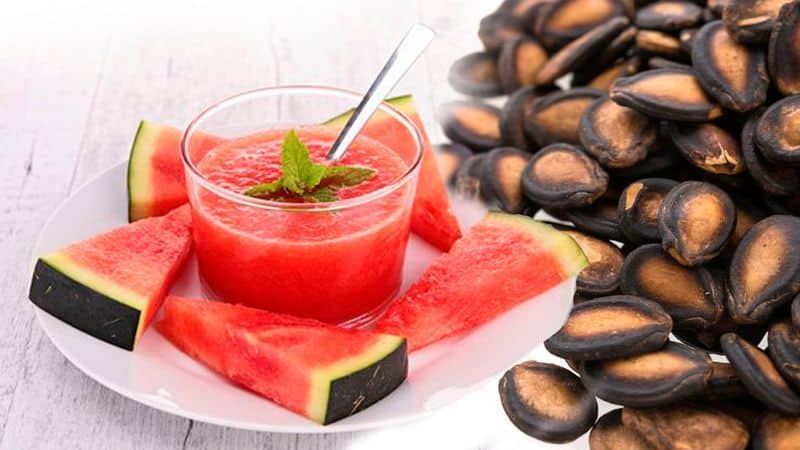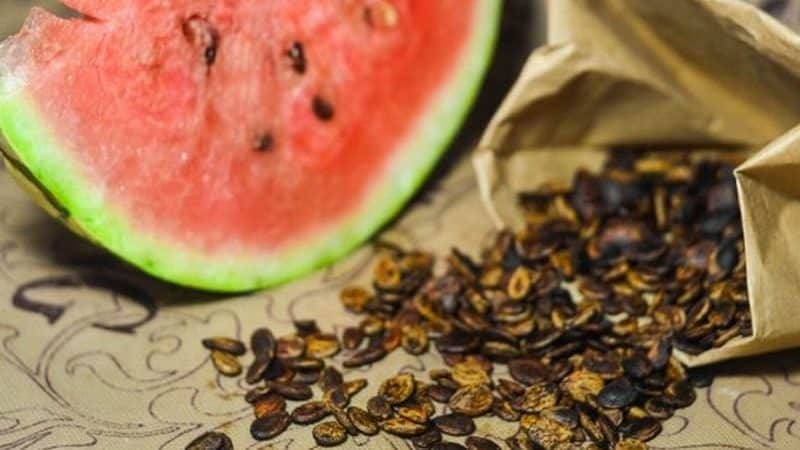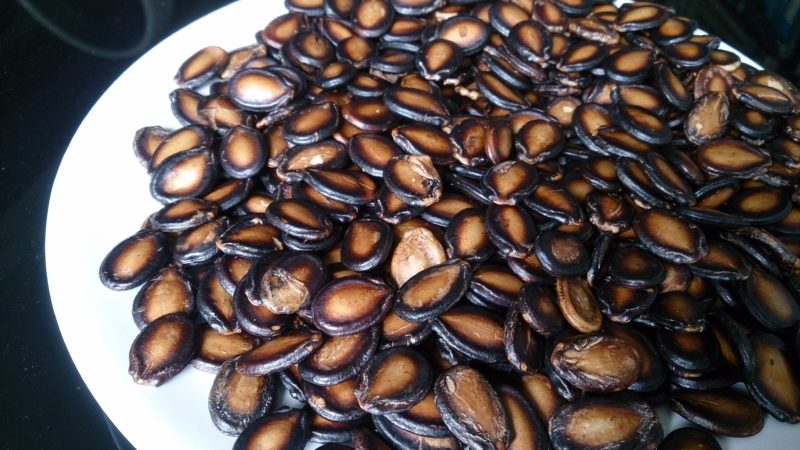How to cook fried watermelon seeds and their benefits
Watermelon - a valuable food product in which not only the fruit pulp is tasty and healthy, but also the seeds. The kernels satisfy the body's needs for calcium, potassium, sodium, magnesium, iron, zinc, B vitamins, PP. They have a beneficial effect on the body as a whole, have anti-inflammatory, diuretic, choleretic, antipyretic effects, stimulate intestinal motility, normalize metabolism, and improve hematopoiesis.
From the article you will learn the composition and properties of seeds, benefits and harm to the body. We will tell you whether they can be fried and how to prepare them correctly, we will describe how to use them in cooking and folk medicine, and we will explain how to store fried watermelon seeds.
Is it possible to fry watermelon seeds?
Watermelon seed kernels are suitable for consumption both fresh and after special processing. They can be fried, dried, or eaten chopped.
The seeds have a specific pleasant taste and can become an alternative to peanuts, sunflower seeds, and if you add sugar and cinnamon, they can replace confectionery products. The seeds prevent heart and vascular diseases and are good for the nervous, digestive and endocrine systems.

Composition and properties of the product
Dried watermelon seeds contain up to 25% fats and fatty acids, which perform energetic and structural functions in a living organism and serve as the main component of the cell membrane.Palmitic, stearic, palmitoleic, oleic, linoleic acids, omega-3 and omega-6 fats are valuable.
The seeds contain proteins, nonessential and essential amino acids: lysine, threonine, arginine, phenylalanine, tryptophan, histidine, alanine, proline, aspartic and glutamic acids and others.
Vitamins and minerals present in the chemical composition:
- vitamin B1 (thiamine);
- vitamin B2 (riboflavin);
- vitamin B5 (pantothenic acid);
- vitamin B6 (pyridoxine);
- vitamin B9 (folic acid);
- vitamin PP;
- macroelements: phosphorus, sodium, magnesium, calcium, potassium;
- trace elements: zinc, copper, manganese, iron.
Watermelon seeds have beneficial properties: they normalize metabolism, stimulate intestinal motility, suppress inflammation, and calm the nervous system. Beneficial for the vascular system of the body: strengthens the walls of capillaries, increases their strength and elasticity, cleanses the blood and liver.
KBZHU
Dried watermelon seed kernels are classified as high-calorie foods. A serving (100 g) contains 557 kcal. Protein - 28.3 g, fat - 47.4 g, carbohydrates - 15.3 g.
Benefits and harms
Arginine is of particular value to the body. It plays an important role in metabolic processes, enhances the production of growth hormone, maintains optimal cholesterol concentrations in the blood, and stimulates insulin synthesis. In addition, it increases blood flow to the genitals, which provides favorable conditions for long-lasting and stable erections, and normalizes the functionality of the prostate gland.
Dried watermelon kernels are beneficial for the cardiovascular system.Vitamin PP reduces the fragility of capillaries, makes the walls of blood vessels stronger and more elastic, and supports redox processes. In addition, it is a powerful antioxidant.
Potassium and magnesium ensure the functioning of the heart muscle, regulate blood pressure, and improve the process of neuromuscular transmission. Regular consumption of watermelon seeds partially meets the body's iron needs. In case of deficiency of this element, hematopoiesis is disrupted, the immune system is weakened, dry skin occurs, and performance decreases.
Dried watermelon seeds have a beneficial effect on activity of the gastrointestinal tract. Fiber improves digestion, stimulates lipid metabolism, removes waste, toxins and excess fluid from the body. It also has good choleretic, diuretic and laxative effects.

For reference. Watermelon seeds are a source of zinc; 100 g of product contains 85.3% of the body's daily requirement. Microelement deficiency is manifested by weakened immunity, loss of acuity of taste and smell, dull and dry skin, menstrual irregularities in women, and growth retardation in children.
In folk medicine, watermelon kernels are valued for their ability to remove uric acid salts from the body, which serves as a good prevention of rheumatism, arthritis and arthrosis of various origins. The seeds show good results in the treatment of gout. They reduce the content of uric acid salt crystals in the joints, prevent their accumulation in the kidneys, reduce the likelihood of the formation of gouty nodes, and increase the period of remission.
Watermelon seeds inhibit inflammatory processes, relieve muscle pain, have antiseptic properties, and reduce high body temperature during fever. Due to the content of alkaline compounds that regulate the acid-base balance, the product is used for acidosis (an upward shift in the acid-base balance).
Watermelon kernels are not always equally beneficial for the body. The seeds contain citrulline. This amino acid can cause a number of complications: dizziness, nausea, vomiting, loss of consciousness, in the worst case, provoke cerebral edema, mental retardation, death. For the same reason, the seeds are contraindicated for children under three years of age, women during pregnancy and breastfeeding.
Important. Even absolutely healthy people need to observe moderation when consuming seeds. The composition contains oxalates and phytins in small doses, which hinder the absorption of minerals.
Possible harm to watermelon kernels is associated with their use in case of individual intolerance to one or more components of the composition. In such cases, an allergic reaction may develop in the form of skin itching, rashes, peeling, and Quincke's edema.
The caloric content and high fat content of seeds can cause weight gain. Therefore, people who lead a sedentary lifestyle or are prone to obesity are recommended to limit the amount of the product or eliminate it completely.
How to fry watermelon seeds
There are several ways to prepare watermelon kernels at home. Below we will look at recipes for salted and dried watermelon seeds.It is important that during the cooking process the kernels do not lose their beneficial and nutritional properties; the chemical composition remains virtually unchanged.
How to cook salted watermelon seeds

Remove the seeds from the edible part of the watermelon, sort them, remove the white kernels, since only dark ones are suitable for eating. Pour into a colander and rinse well with water to remove any remaining fruit pulp. When the water has drained, pour it onto a towel.
Place dry seeds in a preheated dry frying pan and fry over medium heat for 5-6 minutes. Next, prepare a saline solution from 75 ml of water and 1 tsp. salt, pour over the kernels. Cook the seeds until the liquid has completely evaporated and the kernels are dry. Cooled seeds are ready to eat.
Frying in a frying pan
Wash the watermelon seeds, remove any remaining pulp, and dry on a paper towel. Place in a dry, hot frying pan, fry over medium heat for 6-10 minutes, stirring constantly so that the kernels do not burn. Pour the hot seeds onto a flat dish, cover with a towel, and leave for 15-20 minutes.
In the oven
The preparation stage is similar: rinse the seeds and dry them on a towel. Preheat the oven. Cover a dry baking sheet with parchment paper, place the kernels on top, and spread evenly over the surface. Cook at 180°C for 15-20 minutes, stirring occasionally.
Advice. If desired, watermelon seeds can be pre-soaked in salt water. If hot kernels are seasoned with cinnamon and sugar or a pinch of salt and lime juice after cooking, they will acquire an original piquant taste.
Use of watermelon seeds
Watermelon kernels are popular both in cooking and in folk medicine.They can be used as food for pet rodents, parrots and other tropical birds.
The taste and nutritional properties of the seeds are influenced by the quality of the watermelon. It is better if these are the fruits of your own harvest, grown without adding nitrates. If the berry is purchased, then pay attention to the appearance. A good fruit has a whole, shiny peel, with a clearly defined striped pattern. The fruit itself is large, but not heavy, makes a dull sound when tapped, has a dry stalk, and a yellow earthen spot on the side.
In cooking
Peeled watermelon seeds are consumed fresh, dried or salted. As a stand-alone product, they are ideal for lunch or a snack between lunch and dinner. As an ingredient, it is added to vegetable and fruit salads, oatmeal, and soup. The kernels are also processed into oil and flour. In Asia and West Africa, such flour is used as a soup thickener.
In folk medicine

Alternative medicine uses watermelon kernels to treat and prevent a wide range of diseases. They have a detrimental effect on the eggs of roundworms, hookworms, and extraintestinal helminthiases. The seeds are recommended for normalizing metabolism and hematopoietic processes, increasing the body's protective functions.
Watermelon kernels serve as a good prevention of atherosclerosis, myocardial infarction, and coronary heart disease. For disorders of the nervous system, they reduce the effects of stress, reduce nervous excitability, normalize night sleep, and slow down the heart rate.
Advice. Traditional medicine recommends regularly consuming watermelon seeds for men after 35-40 years of age. They support prostate function, are responsible for sexual health and sexual desire, and reduce the risk of prostatitis.
To some extent, the kernels have a beneficial effect on the condition of the skin, hair, and nails: they increase the strength of the nail plate, stimulate the growth of hair follicles and stop hair loss, tone the skin, reduce the number of skin rashes and prevent the appearance of new ones.
A remedy for lowering high blood pressure is prepared from watermelon seeds and peel. To do this, you need to grind the dried kernels and peel into powder using a blender. Take ½ tsp. twice a day for 30 days. The medicine is used as a choleretic agent, but is taken according to a different regimen: 1 tbsp. l. in the morning and in the evening. Continue treatment until positive results are achieved.
A medicinal tea is prepared from watermelon seeds: rinse 20-25 kernels and remove remaining water with a paper towel. Boil 2 liters of water, add the seeds, cook for 15-20 minutes. Strain the cooled drink and take it orally in small portions for two days. Take a 1-2 day break and repeat treatment if necessary. The product helps improve kidney function, increases urine output, and blocks the reabsorption of sodium chloride.
How to store roasted seeds
Fried seeds are stored in clean linen bags for no more than 12 months, avoiding high temperatures, high humidity, and direct sunlight.
Read also:
How to dry watermelon in an electric dryer and store the finished product.
Conclusion
Watermelon seeds are nutritious and beneficial for the body in the absence of contraindications. It contains a lot of protein, amino acids, and vegetable fats, which are necessary for normal metabolism and blood clotting processes.In addition, the components of the complex reduce cholesterol levels and create favorable conditions for the normal functioning of the heart, blood vessels, digestive organs, and nervous systems. Watermelon kernels are especially useful for maintaining male sexual function.
If you fry the seeds with salt or add your favorite spices afterwards, you will get a product with a spicy taste.